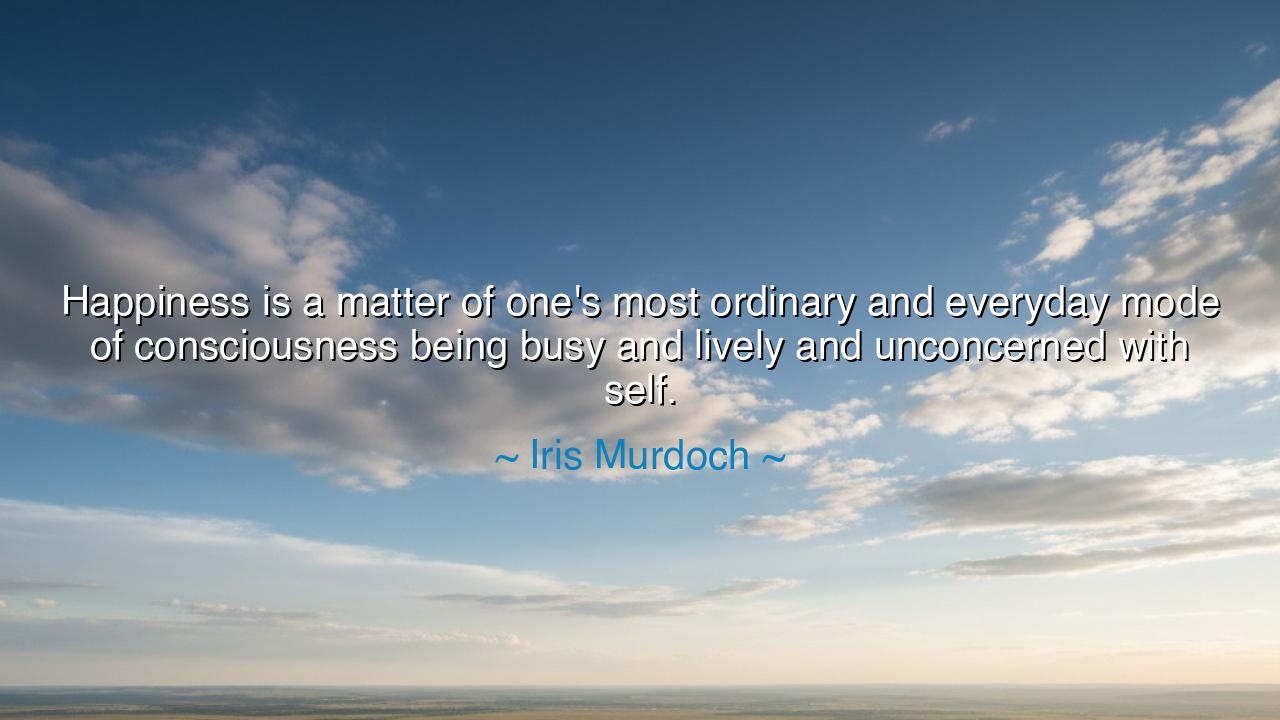
Happiness is a matter of one's most ordinary and everyday mode of
Happiness is a matter of one's most ordinary and everyday mode of consciousness being busy and lively and unconcerned with self.






The philosopher and novelist Iris Murdoch, whose mind moved between art and ethics like a bridge between two worlds, once wrote: “Happiness is a matter of one’s most ordinary and everyday mode of consciousness being busy and lively and unconcerned with self.” These words are quiet in tone, yet within them lies a deep and radiant truth—one that pierces through the illusions of our modern age. For Murdoch does not speak here of fleeting joy or the indulgent pleasure that the world so often confuses with happiness. She speaks of something humbler, steadier, more profound: the peace of a mind alive in the present and freed, even for a moment, from the tyranny of its own ego.
The origin of this quote reflects Murdoch’s lifelong meditation on the nature of goodness, love, and moral attention. Living in the twentieth century—a time of great change, disillusionment, and spiritual confusion—she sought to understand how the human soul could live well in a world that had forgotten its sacred roots. For Murdoch, happiness was not a state to be achieved, but a byproduct of right attention—a clarity of mind that comes when the self ceases to circle endlessly around its own desires and anxieties. When the spirit turns outward—toward beauty, nature, work, or the well-being of others—it finds freedom. Thus, her words are both philosophical and spiritual: to be truly happy is to forget oneself in the act of seeing, doing, or loving.
She reminds us that life’s greatest happiness often dwells not in grand triumphs but in the ordinary—the gentle rhythm of daily being. The farmer tending his fields, the painter at her canvas, the mother watching her child at play—all find in their simple, attentive labor a serenity deeper than any luxury could provide. The key lies in the mode of consciousness—in whether the mind is still and present, or restless and self-absorbed. Murdoch, who admired the moral clarity of Plato and the compassion of the mystics, saw that suffering often arises when the self becomes the center of the universe. But when the self dissolves into wonder, service, or creative work, the soul awakens to the liveliness of existence itself.
We can see this truth reflected in the life of Mother Teresa of Calcutta. Surrounded by poverty and death, she might have been consumed by despair. Yet those who met her described her as radiating peace and joy. Her secret was not ignorance of suffering, but unconcern with self. Her thoughts were not on her own fatigue or recognition, but on the faces of the poor she served. Her consciousness, though immersed in sorrowful work, was busy and alive with purpose. In her everyday mode of being, she found the happiness that Murdoch describes—the kind that flows not from circumstance, but from the direction of the heart.
Murdoch’s wisdom also reveals the paradox of happiness: that the more one seeks it, the less it can be found. The self that demands joy and comfort tightens around its desires, like a fist around sand—the harder it grips, the more it loses. True joy, however, comes when the self loosens its hold, when it allows life to flow through it. In such moments—when we are absorbed in music, in nature, in conversation, in simple work—the boundaries of “I” and “world” blur, and we are, for a brief time, free. This is what Murdoch means by an unconcerned consciousness: a spirit that forgets to measure, to compare, to worry about its own worth, and instead simply is.
The ancients would have understood her perfectly. The Stoics, like Marcus Aurelius, taught that peace comes not from control, but from acceptance; the Buddhists spoke of mindfulness, of dwelling fully in the present moment without clinging or aversion. Murdoch, in her own way, continues this lineage, offering a Western echo of these timeless truths. She calls upon us to reclaim the sacredness of the ordinary, to find happiness not in escaping life, but in inhabiting it completely. For when the heart is quiet, the world itself becomes luminous—the simplest acts, the smallest details, become threads of divine beauty.
So, my child, take these words to heart. Do not chase happiness as though it were a treasure buried somewhere in the distance. Instead, cultivate the ordinary mode of consciousness that Murdoch praises: let your days be busy with meaningful work, lively with curiosity, and above all, unconcerned with self. When you walk, notice the wind; when you speak, listen more than you talk; when you labor, pour yourself into the task without thought of reward. For in forgetting yourself, you will remember life—and in remembering life, you will find joy.
Thus, the teaching of Iris Murdoch endures as quiet light in a restless age: that true happiness is not a prize to be seized, but a grace that descends upon the mind that has learned to serve, to notice, and to love. When your consciousness is humble, awake, and selfless, life itself becomes a blessing—and every breath, every act, every heartbeat becomes a song of peace.






AAdministratorAdministrator
Welcome, honored guests. Please leave a comment, we will respond soon